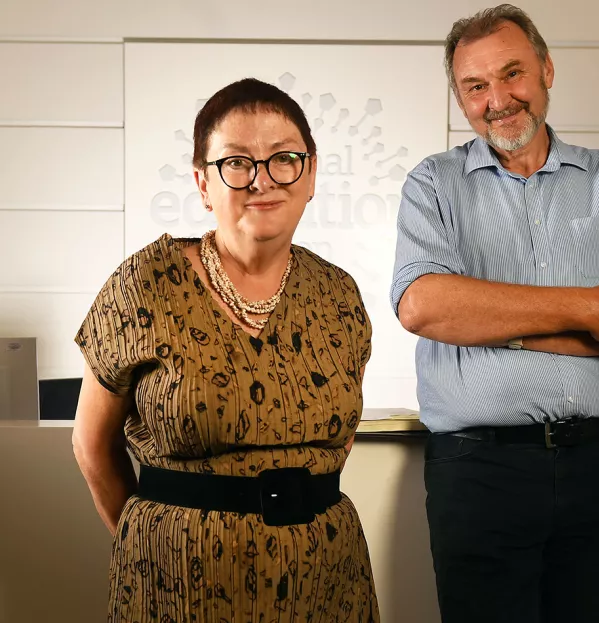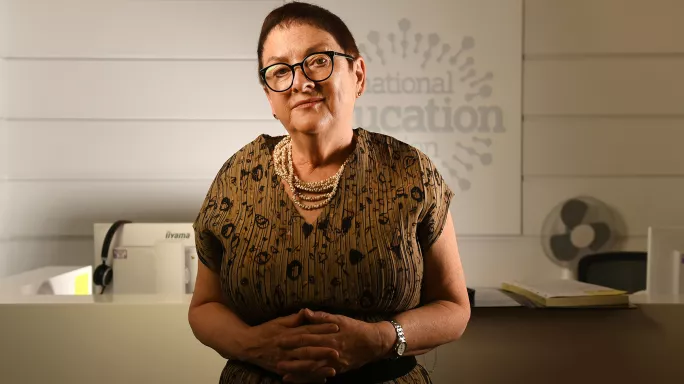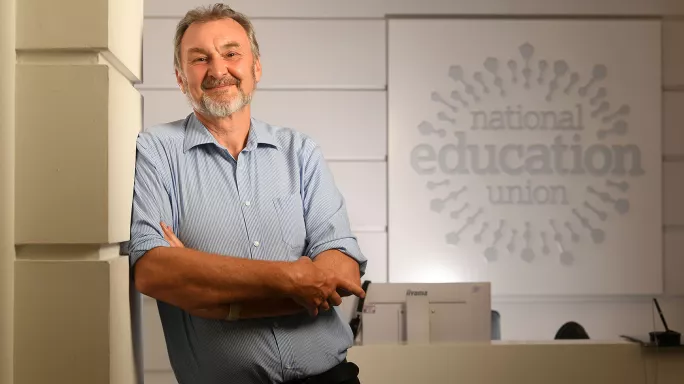Kevin Courtney and Mary Bousted on what’s next for education

The shelves in Mary Bousted’s office in the NEU teaching union’s London headquarters are empty, and she’s surrounded by possessions that are ready to be packed into boxes.
After a six-year tenure, Bousted and fellow joint general secretary Kevin Courtney are ready to hand over their keys.
For the past seven months, the pair have been at the heart of a heated industrial dispute with the government over teachers’ pay. But now, just weeks after a pay deal with ministers was secured, they are preparing to step into what many will see as a well-earned retirement.
Yet while Bousted and Courtney are undoubtedly proud of how far they have pushed the government, they are also insistent that the fight for “pay correction” is far from over.
The government would, Bousted says, be “a bit daft” to go into a general election on the back of “another pay cut” for teachers - yet, given what they have seen in recent months, the pair don’t feel confident that this won’t happen.
Would teachers be willing to go on strike again next year if they are faced with a similar situation on pay?
“In the right circumstances, they would,” says Courtney.
Bousted agrees that if the government “has any sense” it will now look to “correct teacher pay over two or three years” and warns that teachers would be willing to walk out next year “if they’re treated with contempt again”.
NEU members are certainly no strangers to industrial action, having been involved in a total of seven national strike days since 1 February. The strikes - which saw unprecedented cooperation from all four major education unions, as they all pledged to joint action in the autumn term if they got their legal mandates - concluded in the government announcing a 6.5 per cent pay rise for teachers and leaders in England from September 2023, plus a commitment to reducing workload.
Pay and funding will now be a key focus for Daniel Kebede, Bousted and Courtney’s successor, who will step into his role as general secretary of the country’s biggest teaching union on 1 September - although Kebede is perceived to be more left-wing than the outgoing pair, with some voicing concerns over what his priorities will actually be.
Looking back now, how do Bousted and Courtney feel about their time in post? And what is their take on the challenges awaiting their successor?

Before becoming joint general secretary of the NEU, Mary Bousted was head of the Association of Teachers and Lecturers, having been an English teacher. Kevin Courtney, meanwhile, was general secretary of the National Union of Teachers (which amalgamated with ATL to form the NEU) and started out as a physics teacher.
When asked for the achievements they are most proud of, both point to the amalgamation of their two unions to form the NEU in 2017.
“The amalgamation is a huge triumph,” Courtney explains. “People forecast it couldn’t work, that the two unions were too different, that it was impossible to have two general secretaries working together for five years. They referenced other unions for whom that had been very difficult. So, the amalgamation itself is a huge triumph.”
While some would have preferred to see one general secretary rather than two and think the pairing has, in some circumstances, held the leaders back, most are positive about the “legacy” they have created.
Although many concede that the two must have had disagreements, they have managed to keep them private.
The pair have, however, encountered other criticisms. Bousted and Courtney are sure that Kebede will face similar insults to those they have endured - having been dubbed “Bolshevik Bousted and Commie Courtney” by backbench MP and sometime schools minister Jonathan Gullis.
But there are also more serious criticisms - such as the accusation that the NEU as a trade union for UK teachers has been too preoccupied on forming views and passing conference motions on international affairs.
Courtney pushes back against claims that the union has sometimes become too involved in world politics.
“We live in an international world,” he says, and highlights how 49 languages were spoken by pupils in his first placement school - and that his children went to a primary school in Hackney, where 30 languages were spoken.
Courtney believes there is “huge injustice in the world”. This is why the union spends “loads of money on developing the capacity of education in sub-Saharan Africa and around developing women leaders in the unions”, he explains, with a sense of pride.
The NEU is also the largest education union in Europe, Bousted points out.
“We have an international department,” she explains. “We have the capacity to have a social and political function that goes beyond the boundaries of the UK, and I am always surprised that people think this is surprising.”
‘Ofsted has just moved the deckchairs on the Titanic…They’ve not answered any of the fundamental problems’
Yet there are some battles Bousted has had to face that Courtney has not; being a woman at the helm of the country’s largest teaching union has not come without its challenges. Bousted says she has felt particularly targeted by right-wing media, explaining she often gets the “full force of misogyny”.
“There’s no doubt that misogyny is alive and well,” she says. It exists “in the media” and, she concedes, “in the trade union movement”.
Bousted explains how the attacks have left her in tears in the past, but says Courtney has been “a great help” in dealing with them.
Described by colleagues as “impressive”, “impassioned in her arguments” and “willing to step into the limelight”, Bousted has undoubtedly earned the respect of many who don’t agree with her politics.

However, as she prepares to step away from the role, she says there is one argument that she wishes she had won: the battle over Ofsted.
Speaking at the NEU annual conference earlier this year, Bousted said her critique of Ofsted began over two decades ago and admitted that “it was a bit of a lonely place to be” as she was seen as an “unreasonable polemicist”.
Now, she says: “I think the evidence around inspection has been increasingly clear for a long time and yet it’s been very unpopular. There appeared to be no movement whatsoever in terms of inspection for over 10 years, and even though there’s some movement now, it’s nothing like enough.”
The death of headteacher Ruth Perry and the subsequent calls for reform have led to Ofsted making a series of changes - including consulting on a new complaints process and making changes to the timing of return inspections where there have been safeguarding concerns.
But Bousted is clear that this does not go far enough.
“I mean, what they’ve done in Ofsted is just moved the deckchairs on the Titanic enough to get the worst of the heat off,” she explains. “But they’ve not answered any of the fundamental problems.”
She continues: “A change in the complaints procedure, a change in the consequences of missing something technical and safeguarding doesn’t address any of the issues around: if you get an inspection, will you get a decent inspector team? Will they understand what they’re inspecting? Will they have any experience in the age or the phase or the subject they’re inspecting and will they come to a reliable and valid judgement?
“I think the question of who inspects inspectors is a bigger issue.”
‘Schools are going to see teachers exercising their right to speak out about workload much more confidently than before’
Courtney, meanwhile emphasises that the pressures of Ofsted and accountability are still two of the biggest drivers of workload for teachers and leaders in England.
As part of the 6.5 per cent pay rise commitment made by the government last month, they promised the formation of a teacher workload reduction task force.
But this move is far from original. In fact, this will be the third workload reduction taskforce in 20 years, and both Courtney and Bousted doubt the group will make any difference on the fundamental points.
Why agree to it, then? Because, they explain, they believe they can still make gains.
While many of the national headlines claimed that industrial action had ended with the acceptance of the pay deal, this overlooks the fact that the NASUWT union has pledged to continue with action over workload in the autumn term.
Some are sceptical over the NASUWT’s actions, but Bousted and Courtney seem united.
“[The NEU] will be working with them on that,” Courtney explains. “Schools are going to see teachers exercising their right to speak out about workload much more confidently than before.”

The other big outstanding job in the in-tray that Bousted and Courtney pass on to their successor Kebede is the issue of recruitment and retention.
Last year, the DfE missed its target for secondary teacher trainees starting courses in September 2022 by 41 per cent, and there are fears that the picture could be just as bad - if not worse in some areas - this year.
However, the pair point to the effect of years of under-recruitment here, which means that this issue has been a source of tension between government and unions for at least 10 years.

In fact, Bousted recalls what she describes as a “stand-up row” about this issue with then secretary of state Michael Gove - a man whom both she and Courtney would choose as the “worst” holder of this post during their tenure as trade union leaders.
Gove is arguably the most influential education secretary of the past 15 years, with his reforms to school structures as well as exams and curriculum having had a lasting impact.
Yet Courtney was not a fan. “He might have been the most competent but his drives were all wrong. He presents himself as affable and polite. I was never taken in by that,” he says.
Both he and Bousted are also in agreement on their favourite education secretary: Justine Greening.
“You really felt that Justine Greening listened to the points that we were making and made some changes as a result of it,” Courtney explains.
“She wasn’t ideological in a way that so many of them are,” Bousted adds. “And she worked really hard…You don’t need to be politically aligned with someone to respect them.”
On the question of recruitment and retention, Bousted and Courtney are both concerned about the future, and give the impression that this is another issue they wish they could have made more progress in.
While they are pleased that the crisis is now “part of the discourse” for the Labour opposition, they feel there is a long way to go to reverse the fallout of years of low recruitment and high attrition.
Courtney describes the crisis as a “tanker”, explaining that Labour’s job, should they come to power, will be to “change the direction” - a feat that he seems to view as almost impossible. Ultimately, he says, “it’s not Labour’s fault” if they are unable to achieve a turnaround.
Are the Conservatives just biding their time, waiting to add the issue of teacher shortages to the in-tray of the next government? Perhaps. Courtney certainly feels that way about the early years funding crisis, while Bousted adds the state of the school estate to the list.
‘Michael Gove presents himself as affable and polite. I was never taken in by that’
Another outstanding issue that will last well into the next government will be the Covid inquiry, which the government said in 2022 would play a “key role in learning the lessons from the pandemic and informing the government’s preparations for the future”.
In terms of the lessons learned about education, Courtney points to the issue of childhood poverty, which he feels has had “new light thrown on it through Covid”.
“Our members were looking into the homes of the children through the Teams classes in a way that they’d never done before. You’ve got children who have no bedroom or are sharing a bedroom with their dad, who works a night shift and was trying to sleep [while they’re trying to do online lessons],” he recalls.
Bousted, meanwhile, thinks there are big lessons to learn about how teachers are treated. She feels the profession was let down by the government, referencing the high incidence of long Covid in this sector.
“They could have done so much more to protect education workers than they did. And they should hang their heads in shame about that,” she says.

As they head into retirement, Bousted and Courtney leave behind what many in the sector would see as a largely positive legacy.
Arguably, one of their greatest achievements in the past year has been their ability to keep much of the public and, most importantly, parents, on side during a long-running and disruptive strike, while the shadow of the pandemic still loomed large.
There were, however, signs in spring that this support was beginning to wane. Research company Ipsos reported in April that 52 per cent of parents backed strikes, down from 60 per cent at the end of February, while opposition to them had increased from 17 per cent to 29 per cent.
Both Bousted and Courtney were concerned that continuing with strike action could ultimately turn that essential support away - something that Kebede will need to bear in mind if further strikes are on the cards.
It’s not just the hearts and minds of parents that the pair managed to win over, though. As experts in the sector explain, one danger of leading a union movement has, in the past, been to overreach - but many say that Courtney and Bousted have judged the balance between politics and the public well.
It is perhaps a testament to this that during an event to mark their departure, one of the lead speakers paying tribute to Bousted and Courtney was schools minister Nick Gibb.
So, what next for the pair, as they transition out of their posts?
Courtney is considering a degree in geology, lighting up about the possibility of having more time to indulge his passion for science, while Bousted wants to delve more into the world of art history.
As they prepare to step away from what has been an intense time to be a trade union leader, Courtney says he’ll consider staying up until midnight on 31 August to see himself into retirement: his own “new year’s” celebrations.
Will Bousted follow suit? In a word: no. She doesn’t like New Year’s Eve. She thinks she’ll be asleep.
Register with Tes and you can read two free articles every month plus you'll have access to our range of award-winning newsletters.
Keep reading with our special offer!
You’ve reached your limit of free articles this month.
- Unlimited access to all Tes magazine content
- Save your favourite articles and gift them to your colleagues
- Exclusive subscriber-only stories
- Over 200,000 archived articles
- Unlimited access to all Tes magazine content
- Save your favourite articles and gift them to your colleagues
- Exclusive subscriber-only stories
- Over 200,000 archived articles
topics in this article



